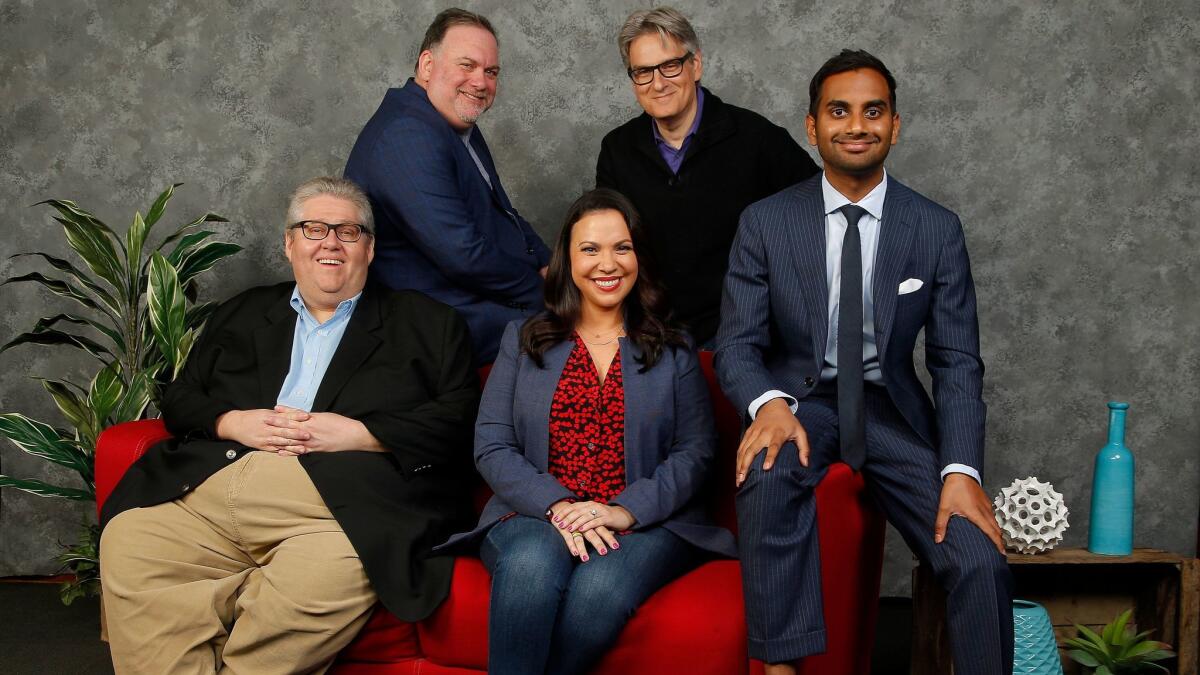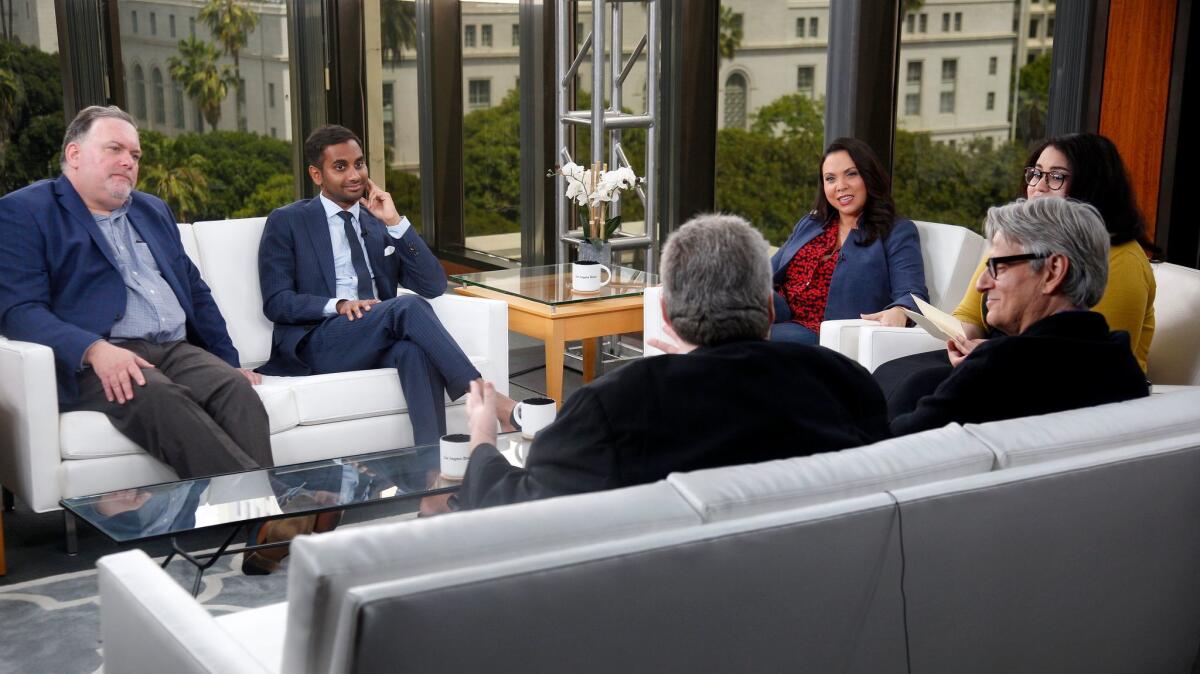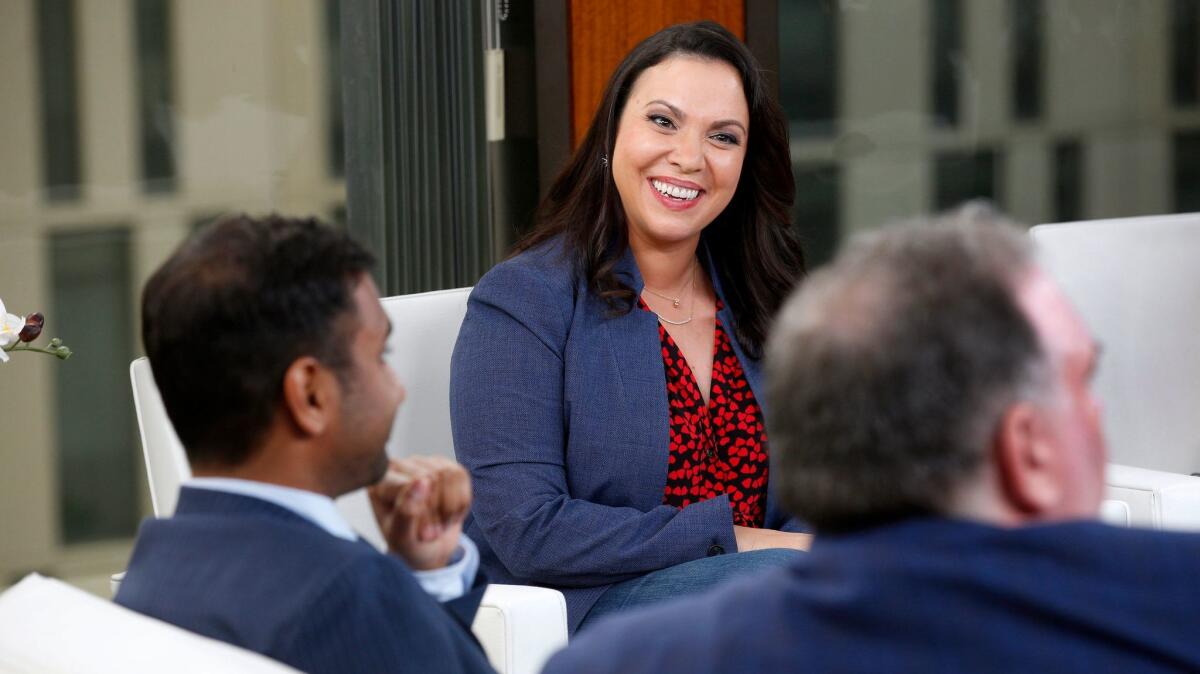Q&A: How Aziz Ansari, David Mandel and other showrunners come up with those riveting scenes (Hint: Ice cream may be involved)

They’ve given us a female president, shown us the ramifications of a brutal theocracy, let us tag along as a good guy turns into a bent lawyer, laid out the travails of dating in the 21st century and demonstrated that a classic ’70s sitcom could find new life.
The Envelope gathered some of the most distinctive and fresh voices in television — David Mandel (“Veep”), Bruce Miller (“The Handmaid's Tale”), Peter Gould (“Better Call Saul”), Aziz Ansari (“Master of None”) and Gloria Calderon Kellett ("One Day at a Time”) — to talk about their craft. The conversation touched on their writing processes, the way storytelling has evolved in a streaming world and feeling like an outsider.
What do you remember about your first time being in a writers room?
Gloria Calderon Kellett: I was terrified.
Bruce Miller: Yeah, I was terrified. I talked way too much.
Aziz Ansari: What was the favorite writers room you were in?
Miller: The ones I've run.
Ansari: What did you change that —
Miller: Couches, not tables.
Ansari: Couches, not tables?
Miller: Yeah, a table kills you. Once you go couches, you can never go back.
Ansari: We just kind of rent a house or something, so it feels, like, a little more homey.
The second season we wrote in New York and we would often, like, just go on walks and stuff, and people would go get ice cream and come back with a scene. My brother came back once and he had all this ice cream on his face. I was like, "You guys didn’t go on a walk. You went and got ice cream." He was like, "Well, we wrote the scene. It's funny."
Gloria, what were you saying about being terrified?
Calderon Kellett: Oh, well, it's just, you know, the only woman and a bunch of very smart Harvard guys — because they’ll tell you.
Miller: Which room is that?
Calderon Kellett: “Quintuplets,” which actually did end up having another woman come aboard, but we weren’t allowed to sit together. We were told we weren’t allowed to sit together.
Ansari: Wait, what?
Gould: What? What?
Miller: Who told you that?
Calderon Kellett: The showrunner.
Ansari: Daaamn.
Calderon Kellett: Yes, and it happens — you know, listen, it happens that the women tend to sit next to each — so we would just text each other all the time.
The second season we wrote in New York and we would often, like, just go on walks and stuff, and people would go get ice cream and come back with a scene.
— Aziz Ansari, "Master of None"
What surprised you about being the boss and the types of tasks that are now your responsibility as a showrunner?
Calderon Kellett: This is my first time running a show and I'm co-running it with Mike Royce, who is wonderful and listed in “Everybody Loves Raymond.” And so he's been a real guide to me, and Norman Lear, obviously — [they] have been real guides to me in showing me the ropes. And our room is half Latino, which is also like, "What? How are we here?" It just blows our minds, because there's such a Latin component to the show, and I didn’t want to be the only one in the room for this specific one.
So, just getting to make those sorts of hiring decisions and what things look like on our sets — it's everything.
Miller: It's interesting … you're a writer, you're a writer, you're a writer, you're a writer, and the skills that you need to be a showrunner aren't at all the skills that you need to become a showrunner. So it's like when you're a computer programmer, and you're a computer programmer, and then they say, "OK, now you're managing a bunch of computer programmers."
Mandel: That’s very L.A.-based, though. My real first full-time job was “Saturday Night Live,” and the one advantage of “Saturday Night Live” that I look back on — you're kind of very much, from Day 1, you are the mini-producer and almost director of your sketches.
I did three years of, like, Friday night, 4 a.m.— when they were still doing tape-to-tape editing — calling edits and learning how to edit. And [if] your sketch was picked, your first job was to go talk to the set decorators, and the second job was go talk to costume, and then go talk to music, and all these things where you didn’t necessarily think you were — I wasn’t like, "Oh, I'm learning to be a showrunner," per se.
See the most read stories this hour »
Ansari: I want to know: What have you done that you found to be effective? For example, in the “Master of None” room, I try to ban people using phones … We try to take walks and keep everybody's energy up. [Are] there things you do to kind of foster a better writers room?
Mandel: I love punching up in a room, obviously. But I despise and refuse to write scenes in a room. There is no writing of scenes in my rooms. We do not group write. We do not — and this is stuff that I guess was sort of imparted on me by Larry David — that’s where I basically learned to write sitcoms, both in terms of the importance of the outline and structure and what you're trying to do, but more important than that, that the writer pitches the stories for his episode and then goes off and writes his episode.
A lot of comedy shows — and this is what I have my issue with — we're all sitting in the room and you pitch out all these wonderful stories, but it's your turn to write the episode. So the writers assistant sort of types all this stuff up and you go off and don't really have any responsibility — ethically or even just comedy-wise responsibility, but it's your turn to write it up and now you're writing it up.
Ansari: I'm like, “We go get ice cream.” (laughter)
Miller: I do think it's a real cultural difference between comedy and drama… In our room, we never write in our room, we don't punch up in our room, we don't touch stuff in our room.
Ansari: What do you guys do in the room then? (laughter)
Mandel: Do you have ice cream? Is there ice cream at least in the room?
Gould: You know, in our case, the way [Vince Gilligan] ran “Breaking Bad” is very much the way we run “Better Call Saul,” and it's the individual, it's a little like “SNL.” Once we talk through the story — that’s what we do in the writers room, we talk through the story in as much detail as we possibly can. Because the idea is that everyone in the room participates in the breaking of each episode. But then the individual writer goes off and writes it.
Miller: That’s exactly what we do.
Gould: And we don't punch up. It's I or Vince or a couple of people will work on the script individually with the writer, but it is that writer's episode.

How important is it to take a break between seasons — in terms of keeping things fresh?
Ansari: The first season [of “Master of None”] came out November 2015. And this season is May 2017. Whenever we finished, Netflix is like, "All right, so are you guys ready to get back in the room?" I was like, "No." At first, they were a little bit resistant, but I was like, "Look, man, I, dumped my head into this first season. I need to live life and be a person and have some stuff —"
Mandel: Yeah, we were talking a little bit about that before — which was, you get to the end of a “Curb Your Enthusiasm” season and it's sort of like your little notebook is empty.
Ansari: I'm so glad you guys do that, because it's great for me when I'm on the phone calls to be like, "Hey, man, look at ‘Curb’…Got to get that ‘Curb’-style break."
Mandel: You have to. Back in the day on “Seinfeld” [Mandel wrote on “Seinfeld” and “Curb Your Enthusiasm”], when people were submitting ideas, that’s how we would hire writers — we weren’t reading specs as much as “Let's have some idea pitches.” You go through the idea pitches … and you go, no, no, no, and you get to the one on the bottom and you'll be like, "This weird argument you had in the electronics store, is that real? That happened to you, right?" And the guy would be like, "Yeah, how did you know?" And it's like, because these are all fake. But this is really interesting, because this is the real thing. In every episode I ever wrote of “Seinfeld” and then into “Curb,” it's all stuff that happened to me or someone I knew that I stole —
[With “Veep”], obviously, there's the political side to it, but a lot of the personal stuff can be things that you can pull from those same life experiences and then turn into sort of the political equivalent. But it is a little harder, because of that exact reason.
This year with [Selina] out of office, we did a lot of talking to presidents that lost, so we talked to a lot of people that worked for the first Bush administration —
Gould: Oh, wow.
Mandel: Because they didn’t think they were going to lose to Clinton, so they were shocked, and they had no plans and no jobs, and a lot of them were blamed. And we had Mitt Romney come in and talked to him and, you know —
Ansari: Mitt Romney did a few days on “Master of None” too. He loves ice cream.
[laughter]

Miller: I think one of the things you said that’s really interesting is, in a comedy room, bringing in your own personal stories. In our room, we have the same thing, but the show, “The Handmaid's Tale,” the stories that people bring in, you have to have created a safe space over a really long time so people feel comfortable. Our room is primarily women, explaining to men how certain very intimate things feel or work that you just wouldn’t know any other way. No matter how much you’ve talked to, how much you’ve read, how many sisters you have, you just don't know.
Calderon Kellett: Yeah, and we do that on “One Day at a Time” too, because it's a family story, so obviously, a lot is pulled from my relationship with my mother … my parents are at every episode. My dad's dead on the show, he's a little upset by that, because he's alive in L.A. We have a lot of really personal stuff, and the characters are Cuban because my family is Cuban, and at one point, we had to do an episode about the Pedro Pan movement, which is my parents’ story of how they came here. And [I had] never heard that story, so the room was like, "Can we have them come in?" I'm like, "I mean, I'll ask them." And there's also a veteran component to the story, so we'd been having a lot of veterans come in and talk about going to war.
Miller: Having people come in is just the best. When I was on “ER,” they used to do nurses night, so they'd bring in, like, 10 nurses and 20 bottles of wine, and we'd get stories for the whole season
Ansari: Wow … There's an episode, where I'm not in the episode, and it's about just three different groups of just random New Yorkers — one story is about a doorman, another one is about a cab driver, another one is about this deaf woman. And we interviewed just so many doormen and deaf people and stuff, and you just realize, “Oh, everyone could have their own show.”
Mandel: We used to joke that in the “Seinfeld” diner that basically at every table were four people who thought everybody else in the diner were a bunch of … idiots. And in some weird way, they had their own sitcom, basically.
Talk about the way you sort of pushed the limits of what you could do on TV. Peter, you have had story lines that are sometimes silent, basically.
Gould: That’s one of the things that I find I love, when we can dispose of dialogue and just do pure filmmaking. It's like going back to film school or getting to go to film school and getting to experiment with the medium and how we can tell a story. We have some characters like Mike, played by Jonathan Banks, who doesn’t say a lot. And when he does talk, he's not telling you what he's thinking. And I think we're just fascinated, I'm fascinated, by the idea that when people are talking, the real story is happening underneath the dialogue or in parallel with the dialogue. A lot of our characters find it very hard to speak their minds. And it's interesting to try to find a way to use the medium to get under their skin.
A lot of our characters find it very hard to speak their minds. It's interesting to try to find a way to use the medium to get under their skin.
— Peter Gould, showrunner of "Better Call Saul"
Do you think about how people will watch your show? How much does that come into play in the writers room, thinking if they’ll watch, like, three or four at a time, if they’ll stock them up or if they will piece it out?
Calderon Kellett: I think about it a lot more this season than I did last season because we premiered Jan. 6 and that evening people were tweeting us, "When's Season 2?" Once you realize that there are some people that are consuming it that way, I can't help but think [about it].
Miller: It's a big issue. It was my first question when
Ansari: It's hard, though, because you don't know how people are going to watch it. To me, each season is kind of a singular piece, so, like, if I read a review of the show where someone just watched four episodes, I'm like, “Well, you didn’t really watch the thing we made.” That’s like watching 40% of a movie that was made. That’s not really reviewing the entire arc of the season. And it's really frustrating, because it takes a year to make a season of the show and then it finishes [and audiences say], "That’s it? Where's the rest?"
Miller: Yeah.
Ansari: And it's like, “Well, man, I don't know.”
Gould: For me, anyway, it's not so much are they watching it all at once? But it's that people are paying such close attention and they have the ability to go back and refresh themselves on what happened. And that gives us the opportunity to be very subtle, and to set something up at the beginning of the season and have it pay off at the end… it gives us the ability, you know, to not be too redundant with the information.
Miller: Clarity becomes much less of a chore —
Mandel: I completely agree with and I love doing all of those things. I guess I never credited it to any notion like streaming — to me, it just was part of, like, as television sort of started moving in a better direction, which was just sort of going, “They're not idiots. We don't have to every time explain things.”
From the Oscars to the Emmys.
Get the Envelope newsletter for exclusive awards season coverage, behind-the-scenes stories from the Envelope podcast and columnist Glenn Whipp’s must-read analysis.
You may occasionally receive promotional content from the Los Angeles Times.




